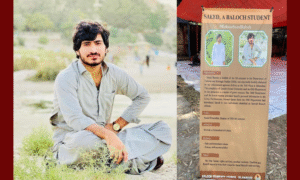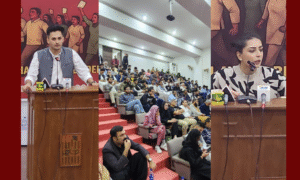Sajid Hussain was a free man in his heart and mind, writes Salman Sikandar
Franz Kafka once wrote, “You are free and that is why you are lost.” This sentence did not make sense to me until I got to know about someone who was writing about the bizarre Kafkaesque reality of his time.
Sajid Hussain’s life was a symbol of resistance, love and empathy. He was a huge fan of literature and art, especially the German writer Franz Kafka. Yet, he probably had no idea that his own life would come to resemble a Kafkaesque story, in which he would be the protagonist holding high the flag of love, justice and truth in a world full of oppression. The end of his life’s story, just like a Kafka tale, was tragic. But this tragedy carries the potential to make thousands realize that the struggle for justice does not always have a happy ending – yet it can inspire many people to pick up that flag . This is why this flag of justice is still waving high, and it will remain this way as long as there are people like Sajid Hussain.
Deep love and empathy for his people made him join the profession of journalism after graduating from Karachi University. One of his old colleagues and friends, Xari Jalil tells about the first time she got to know him through a senior who introduced him by saying, “Meet our rising star Sajid. He is from Karachi University and has joined us on the national desk. He writes beautifully and has a great knowledge about many things.” His love for art, culture and politics compelled him to write on these topics. At the same time, he also covered some ground-breaking stories, which included one on Iran’s missile attacks on Balochistan to target militant organizations and the links between Baloch insurgency with Iran. He reported on one of the biggest drug lords of this region Imam Bheel; he interviewed Bill Gates on his apprehensions about Pakistan’s efforts against polio and other diseases.
Hussain was fond of books, especially those on literature. His decades-old friend Taj Baloch reminisces about their discussion on literature. “I remember the first book he gave me to read when we were discussing Urdu literature. It was writings of Muhammad Hassan Askari. We discussed his work for a long time in many meetings, specially his Haramjadi (a short story) and one of his articles on literature. I remember his comments on Askari’s article on progressivism in literature: ‘Askari is at least saying something what he himself believes, not because of his ideology and not taking a hard side on this.’”
Xari Jalil tells how he was a huge admirer of Franz Kafka, “His favourite book was Ulysses by James Joyce but he was mad about Kafka – just obsessed with him all the time.”
Sajid was a true empath; he knew how to understand someone’s pain, perhaps because he was used to seeing the pain of his own people. Taj Baloch speaks about his phenomenal empathy, “He was a very good listener. He would never interrupt you when discussing something. He was a wise and sincere person. His advice was always mature and helpful in hardest of times. He was too reasonable!”
Sajid Hussain never became a blind follower of any ideology. He was free in his heart and mind. He believed in exchanging ideas and learning from others. He simply didn’t know the language of violence .
Xari speaks about his eagerness to learn, “I learnt things from him, and he learnt from me. He was never egotistical about learning from others, and he laughed so hard when you told him a funny story. All the laughter in him seeped out though when his uncle, along with two other Baloch people, went missing. Then a week later, they were found with torture marks on their bullet-riddled bodies, their hands tied behind them. Sajid disappeared for some time after that, back to his home town in Kech, right near the border of Balochistan-Iran. When he returned, he looked scared. His face was shining with perspiration and his eyes were blood shot and wide. He looked nervous. He said his mother was scared for him, especially in Karachi.”
His most courageous and ground-breaking work which irked authorities was on missing persons from Balochistan. Where it was amazing journalistic work, it also disturbed many who were the antagonists in his Kafkaesque reality. They broke into his house one day and forced him to go in the exile. Leaving his family behind, Sajid went in the exile and moved to Sweden in 2017. He knew he had only one choice: death or freedom to speak. He knew that his fate would be sealed if he kept crossing the ‘red lines.’ Yet he chose to speak for his people over his own life.
The exile couldn’t diminish his love for his land and people. Xari Jalil tells about his initial days in exile, “He never liked living in exile – not once. Despite his happiness and contentment on the surface, he was always missing his family and his land. He always wanted to return. He was most pained when he thought about his children, how they were growing up and how he could not see them. But he was happy to be working on this Balochi dictionary at the University of Upsalla. He had done the work in three months, a friend tells me that had been pending for the last 20 years.”
He kept on fighting the battle through journalism. He founded the Balochistan Times which reported about Balochistan and also kept writing blogs. “Terra Icognito” was his name on his blog which ironically means a place which is not covered by the maps. Reading those blogs makes one realize that how much love he had for the culture and art of his land. He wanted to show the world that Balochisan also exists on the map by sharing its folk songs and poetry. This was his resistance through art, love and journalism yet it had to end in a sad way. In one of his blogs about Baloch folk songs, he quotes a lullaby sung by Baloch mothers,
“If you die as a hero in the battlefield
I’ll sing songs of happiness, not elegies, over your grave.”
Sajid’s body was found in Sweden a few days ago. Truly, Sajid died as a hero in the war of love against injustice. As a Kafkaesque hero of his own story, he was free in his world yet in the bizarre world of injustices, he was lost.
The Students’ Herald News Desk focuses on reporting the latest news regarding student politics and campus updates to you.
The News Desk can be reached at admin@thestudentsherald.com




